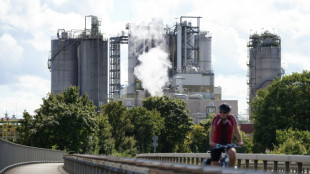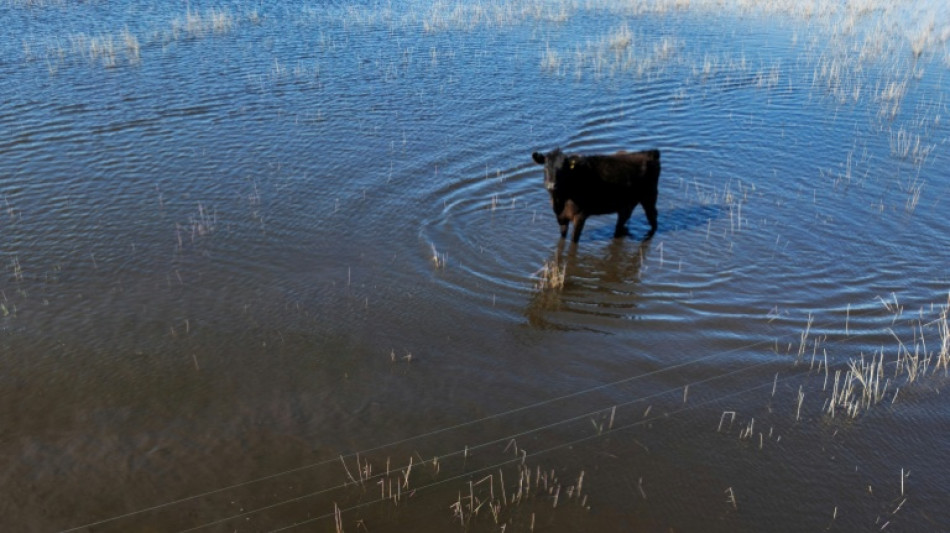
-
 Duffy takes four as New Zealand crush West Indies to seal T20 series
Duffy takes four as New Zealand crush West Indies to seal T20 series
-
South Korea halts flights for college entry exam

-
 Trump signs bill to end record-breaking US shutdown
Trump signs bill to end record-breaking US shutdown
-
EU lawmakers to vote on unpicking green business rules

-
 Smith says England speed kings could struggle in Ashes
Smith says England speed kings could struggle in Ashes
-
Stocks stutter with focus on Fed, tech after US reopen vote

-
 Record-breaking US shutdown ends as political fallout begins
Record-breaking US shutdown ends as political fallout begins
-
France marks decade since harrowing Paris attacks

-
 Skubal, Skenes win MLB Cy Young Awards for top pitchers
Skubal, Skenes win MLB Cy Young Awards for top pitchers
-
Record rains turn Argentina's farm-filled Pampas plains to wetlands
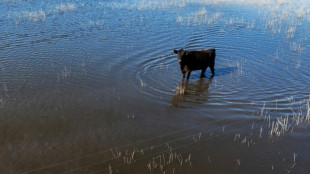
-
 Solar storm brings new chance of vivid auroras, signal disruptions
Solar storm brings new chance of vivid auroras, signal disruptions
-
Gauff and Fritz back for United Cup against Swiatek's Poland

-
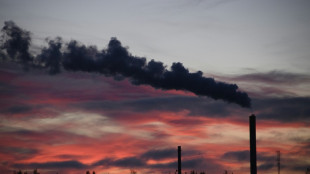 World's fossil fuel emissions to hit new record in 2025: study
World's fossil fuel emissions to hit new record in 2025: study
-
US jury: Boeing owes $28 mn to family of Ethiopian Airlines crash victim

-
 G7 calls for urgent Ukraine ceasefire, de-escalation in Sudan
G7 calls for urgent Ukraine ceasefire, de-escalation in Sudan
-
New Epstein emails claim Trump 'knew about the girls'

-
 Brazil tribal chief ready to give Lula a 'talking-to'
Brazil tribal chief ready to give Lula a 'talking-to'
-
Clippers' Beal to have season-ending surgery - report

-
 Dow ends at record on hopes US government will reopen
Dow ends at record on hopes US government will reopen
-
Portugal's Ronaldo hoping Ireland fans boo him

-
 England set for Etihad start to Euro 2028 tournament campaign
England set for Etihad start to Euro 2028 tournament campaign
-
Sinner cruises past Zverev and into last four of ATP Finals

-
 US presses final penny after more than 230 years
US presses final penny after more than 230 years
-
Baxter says England must be 'selfless' to see off All Blacks

-
 Pardoned French-Algerian writer Sansal arrives in Germany
Pardoned French-Algerian writer Sansal arrives in Germany
-
Bayern battle back to shock Arsenal in Women's Champions League

-
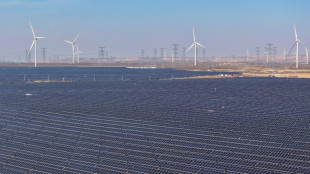 China hopes US will 'some day' return to climate fold, official tells AFP
China hopes US will 'some day' return to climate fold, official tells AFP
-
Trump 'knew about the girls,' new Epstein emails claim

-
 Scotland 'optimistic' Russell will be fit to face Argentina
Scotland 'optimistic' Russell will be fit to face Argentina
-
Big platforms chart gradual path to self-driving at Web Summit

-
 Jane Goodall honored in Washington by conservationists including DiCaprio
Jane Goodall honored in Washington by conservationists including DiCaprio
-
Tuberculosis killed 1.23 million last year: WHO

-
 New Zealand coach Robertson says Twickenham visit is 'why I'm doing the job'
New Zealand coach Robertson says Twickenham visit is 'why I'm doing the job'
-
Hopes of US shutdown deal fail to sustain market rally

-
 US military personnel do not risk prosecution for drug strikes: Justice Dept
US military personnel do not risk prosecution for drug strikes: Justice Dept
-
Jailed writer Sansal on way to Germany after Algeria pardon

-
 Ukraine ministers resign over major corruption scandals
Ukraine ministers resign over major corruption scandals
-
Record-breaking US shutdown to end as political fallout begins

-
 Wallets, not warming, make voters care about climate: California governor
Wallets, not warming, make voters care about climate: California governor
-
Astronomers spot storm on another star for first time

-
 G7 foreign ministers seek to boost Ukraine war effort
G7 foreign ministers seek to boost Ukraine war effort
-
Released Epstein emails allege Trump 'knew about the girls'

-
 Rees-Zammit back in Wales 'happy place' after Test return
Rees-Zammit back in Wales 'happy place' after Test return
-
Chelsea winger Sterling's house burgled

-
 Auger-Aliassime beats Shelton to get off mark at ATP Finals
Auger-Aliassime beats Shelton to get off mark at ATP Finals
-
Argentina's Milei to follow Trump in skipping S.Africa G20: spokesperson

-
 Back on track: Belgian-Dutch firm rescues Berlin to Paris sleeper train
Back on track: Belgian-Dutch firm rescues Berlin to Paris sleeper train
-
Los Angeles 2028 Olympic Games schedule revealed

-
 Wolves appoint Edwards as manager in bid to avoid relegation
Wolves appoint Edwards as manager in bid to avoid relegation
-
UK music industry warns growth threatened by AI, Brexit


Record rains turn Argentina's farm-filled Pampas plains to wetlands
Parts of the Argentine Pampas, a vast expanse of flat grasslands, look more like wetlands these days following record rains, with local farmers warning of a "catastrophic" impact to their livelihoods.
An unusual downpour in March, followed by more rains since then, turned the usually temperate region's rural roads into canals, drowned crops and left cows stranded, searching hopelessly for pasture in the mud.
With drainage infrastructure unable to cope, some five million hectares -- an area larger than Denmark -- now stand under water, transforming one of the world's most productive agricultural areas into a patchwork of lagoons.
Scientists say climate change likely played a role in the freak rains, and for a severe drought that preceded it.
Locals insist the situation was made infinitely worse by a backlog in road, canal and drainage works.
Cattle rancher Luciano Macaroni from the hard-hit municipality of 9 de Julio -- named after the Argentine Independence Day and some 300 kilometers (186 miles) west of Buenos Aires -- doesn't dwell too much on the cause, just the effect.
"In March, we had to move to town so the kids could go to school," he told AFP by telephone from his farm, accessible only on horseback due to flooded roads.
"I couldn't plant, my cows got skinny from being in the water, and I have no way to bring them food," the 46-year-old lamented.
A neighbor, 43-year-old grain and cattle farmer Alejandro Vallan, fears the consequences will be felt even more severely next year.
"We can't plant, we don't have animals. What the hell are we going to do?" he asked.
"There are people 60 or 70 years old who saved their whole lives to have their cows, and now they've lost them."
- 'Catastrophic' -
9 de Julio is one of the districts most affected among 28 declared emergency areas by the Buenos Aires provincial government.
The "catastrophic" situation "is going to create a regional economic problem," said Hugo Enriquez, president of SRA farmers' union.
It will affect "transportation, contractors, farms, storage facilities, and those who sell supplies," he told AFP.
So far in 2025, rainfall in the Buenos Aires province has exceeded 1,600 millimeters -- almost double the annual average.
Two years ago, the region also suffered one of its worst droughts in decades.
"It is clear that there are issues related to climate change and... the increased frequency of very severe weather events," said Javier Rodriguez, the province's minister of agrarian development.
Cindy Fernandez of the National Meteorological Service said a warmer atmosphere means more water vapor in the air, "and therefore more water available for increasingly heavy precipitation."
For 9 de Julio mayor Maria Jose Gentile, the role of climate change is undeniable.
"To ignore that is to not see reality," she said.
According to a report by the World Weather Attribution (WWA) scientific network, "it is likely that climate change increased the likelihood and intensity of the heavy rainfall" recorded in March.
- Politics -
Some of the Pampas plains have been transformed into a marsh of stinky, stagnant water shrouded by clouds of mosquitos and a deafening chorus of frogs.
Residents say upgrades to roads and canals in the region have been pending for decades, as well as the dredging of the Salado River -- the main drainage system.
Rodriguez, the provincial minister, said progress was halted after budget-slashing President Javier Milei took office in December 2023, with dredging work coming to a stop.
After the flooding, Milei's Security Minister Patricia Bullrich announced resources to "open roads and reach isolated families."
But she insisted the dredging work falls within the ambit of the provincial government, which is led by the country's main center-left opposition party.
"No one takes responsibility, and everyone blames the previous administration. We want solutions," Raul Daguerre, a livestock trader, said of the political impasse.
Argentina is one of the world's leading food producers. Its agro-industrial sector represented 58 percent of Argentina's total exports in 2024.
I.Stoeckli--VB

